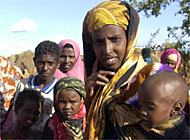UN agency says growth key to combating poverty

Extreme poverty has declined in Asia over the past 25 years but has grown steadily in Africa, where nearly 65 per cent of the population lives on less than a dollar, a new UN report says.
Issued on Tuesday by the UN Conference on Trade and Development (UNCTAD), the report also warns that poverty is set to increase around the world by 30 per cent – up from 307 million today to 420 million by 2015.
Switzerland backed the report’s primary conclusion – that encouraging economic growth was the best way of combating poverty, but only if it happens within the right framework.
The international community has agreed to a goal of halving extreme poverty by 2015.
Poverty trap
“This poverty trap is not intractable,” said report author, Charles Gore.
“But it has to be the kind of growth that raises average household income and consumption.”
Gore said the average per capita consumption of the world’s least developed countries (LDPs) remains just 57 cents per day.
Gore said the current system promoted by the international financial institutions was too much like the structural adjustment policies of the 1990s, placing too much emphasis on short-term stabilisation and not enough on long-term development.
“The current approach assumes that these countries are not being integrated into the world economy, so efforts are being directed towards integration rather than mechanisms for growth.”
He says that exports and imports contribute a similar amount to the GDP of LDPs as they do in industrialized countries. The problem is less a question of integration in the global marketplace, and more an over-reliance on certain commodities, which continue to loose their relative value.
Diversification
The Swiss government agrees: “More effort needs to be made in incorporating trade policies into overall development strategy,” said Michel Mordasini, deputy head of the Development and Transition Department at the State Secretariat for Economic Affairs (Seco).
He told swissinfo that Switzerland wanted to help the poorest countries to formulate their own trade strategies, encourage them to diversify their exports and campaign for greater market access.
Mordasini said Switzerland agreed with UNCTAD on the need for growth, but differed on the question of macroeconomic stabilisation.
“We want to contribute to rapid economic growth, through private investment, market forces and integration in the world economy,” Mordasini says.
“But we believe that discipline in public finance management is a crucial precondition for establishing the necessary framework for the development of the private sector and expansion of trade.”
Aid targets
Economic growth and investment are not the only way of combating poverty, of course. UNCTAD, like the rest of the UN system would like to see a big increase in official development aid (ODA). The trend, however, has reflected a dramatic drop in real terms.
“Aid in 2000, in real per capital terms, was 46 per cent of what it was in 1990. A doubling of aid would merely mean a return to 1990 levels,” Gore says.
Only a handful of industrialised countries have succeeded in meeting the UN target of giving at least 0.7 per cent of GDP in ODA. Switzerland is not one of them, even if it ranks seventh in the list of OECD contributors.
On Monday, the Swiss Agency for Development and Cooperation (SDC) and Seco announced that in 2001, ODA had remained static at 0.34 per cent of gross national product (GNP). They concluded that “the goal of the federal government to reach 0.4% of GNP by 2010 is still a long way off”.
While a jump from 0.34 to 0.4 per cent might appear relatively small, Mordasini says it would actually require an annual increase in the overall development budget of over six per cent.
by Roy Probert

In compliance with the JTI standards
More: SWI swissinfo.ch certified by the Journalism Trust Initiative
You can find an overview of ongoing debates with our journalists here. Please join us!
If you want to start a conversation about a topic raised in this article or want to report factual errors, email us at english@swissinfo.ch.